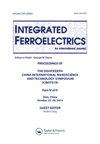钠过量对(Bi 0.487 Na 0.427 K 0.06 Ba 0.026) tio3无铅压电陶瓷晶体结构、铁电性能和压电性能的影响
IF 0.7
4区 工程技术
Q4 ENGINEERING, ELECTRICAL & ELECTRONIC
引用次数: 0
摘要
摘要:本研究采用常规固相混合氧化法制备(Bi0.487Na0.427 k0.06 ba0.026)TiO3陶瓷,加入过量的Na,根据化学式(Bi0.487Na0.427+xK0.06Ba0.026)TiO3,其中x = 0.0, 0.005, 0.010, 0.015和0.020。系统地研究了钠过量对晶体结构、介电、铁电和压电性能的影响。x射线衍射数据确定了所有成分的纯钙钛矿结构。x = 0.0 ~ 0.005时为拟锥体结构,x≥0.015时为菱形结构。随着钠过量量的增加,晶粒尺寸逐渐增大。增加x也导致铁电弛豫转变温度(TF-R)从80°C (x = 0)大幅增加到110°C (x = 0.020)。当x从0增加到0.020时,标准极化电场(P-E)迟滞测量结果显示剩余极化(Pr)减小,外加矫顽力场(Ec)增大,剩余P-E迟滞测量结果进一步证实了这一点。此外,压电常数(d33)也随着x的增加而稳步降低。TF-R和Ec升高,d33和Pr降低,表明Na过量诱导铁电序稳定。本研究强调了充分控制a位化学计量的重要性,以及它如何影响bnt基陶瓷的铁电和压电性能。关键词:无铅BNT-BKT-BT陶瓷sna -过量位点非化学计量学铁电特性压电特性致谢本工作得到了国家科学研究与创新基金(NSRF)通过南京大学的资助(批准号:No. 5)。R2565B059)。作者要感谢清迈大学理学院物理与材料科学系电陶瓷研究实验室的Gobwute Rujijanakul教授为铁电测试系统提供的设施支持。此外,特别感谢Nitish Kumar博士在校对和语法检查手稿方面提供的宝贵帮助。披露声明作者未报告潜在的利益冲突。本文章由计算机程序翻译,如有差异,请以英文原文为准。
Effects of Na Excess on the Crystal Structure Ferroelectric and Piezoelectric Properties of (Bi 0.487 Na 0.427 K 0.06 Ba 0.026 )TiO 3 Lead-Free Piezoceramics
AbstractIn this research, (Bi0.487Na0.427K0.06Ba0.026)TiO3 ceramics were prepared by conventional solid-state mixed-oxide method to incorporate Na excess according to the chemical formula (Bi0.487Na0.427+xK0.06Ba0.026)TiO3, where x = 0.0, 0.005, 0.010, 0.015 and 0.020. The crystal structure, dielectric, ferroelectric and piezoelectric properties were systematically investigated with respect to the amount of Na excess. X-ray diffraction data identified pure perovskite structure for all compositions. The pseudocubic structure was observed for x = 0.0 − 0.005 before it transformed to rhombohedral structure at x ≥ 0.015. The grain size tended to be larger with increasing Na excess amount. Increasing x also led to a substantial increase in ferroelectric-relaxor transition temperature (TF-R) from 80 °C (x = 0) to 110 °C (x = 0.020). With increasing x from 0 to 0.020, the standard polarization-electric field (P-E) hysteresis measurements revealed a reduction in remanent polarization (Pr) together with an increase in coercive field (Ec), which was further confirmed by the remanent P-E hysteresis measurements. In addition, the piezoelectric constant (d33) was also found to steadily decrease as x increased. The observation of increased TF-R and Ec along with a decrease in d33 and Pr indicated a stabilization of ferroelectric order induced by Na excess. This research highlights the importance of sufficient control over A-site stoichiometry and how it affects the ferroelectric and piezoelectric properties of BNT-based ceramics.Keywords: Lead-free BNT-BKT-BT ceramicsNa-excessA-site nonstoichiometryFerroelectric propertiesPiezoelectric properties AcknowledgmentsThis work received financial support from the National Science, Research, and Innovation Fund (NSRF) through Naresuan University (Grant No. R2565B059). The authors would like to extend their gratitude to Prof. Dr. Gobwute Rujijanakul for providing facility support with the ferroelectric test system at Electroceramics research laboratory, Department of Physics and Materials Science, Faculty of Science, Chiang Mai University. Additionally, special thanks are given to Dr. Nitish Kumar for his invaluable assistance in proofreading and grammar check the manuscript.Disclosure StatementNo potential conflict of interest was reported by the author(s).
求助全文
通过发布文献求助,成功后即可免费获取论文全文。
去求助
来源期刊

Integrated Ferroelectrics
工程技术-工程:电子与电气
CiteScore
1.40
自引率
0.00%
发文量
179
审稿时长
3 months
期刊介绍:
Integrated Ferroelectrics provides an international, interdisciplinary forum for electronic engineers and physicists as well as process and systems engineers, ceramicists, and chemists who are involved in research, design, development, manufacturing and utilization of integrated ferroelectric devices. Such devices unite ferroelectric films and semiconductor integrated circuit chips. The result is a new family of electronic devices, which combine the unique nonvolatile memory, pyroelectric, piezoelectric, photorefractive, radiation-hard, acoustic and/or dielectric properties of ferroelectric materials with the dynamic memory, logic and/or amplification properties and miniaturization and low-cost advantages of semiconductor i.c. technology.
 求助内容:
求助内容: 应助结果提醒方式:
应助结果提醒方式:


